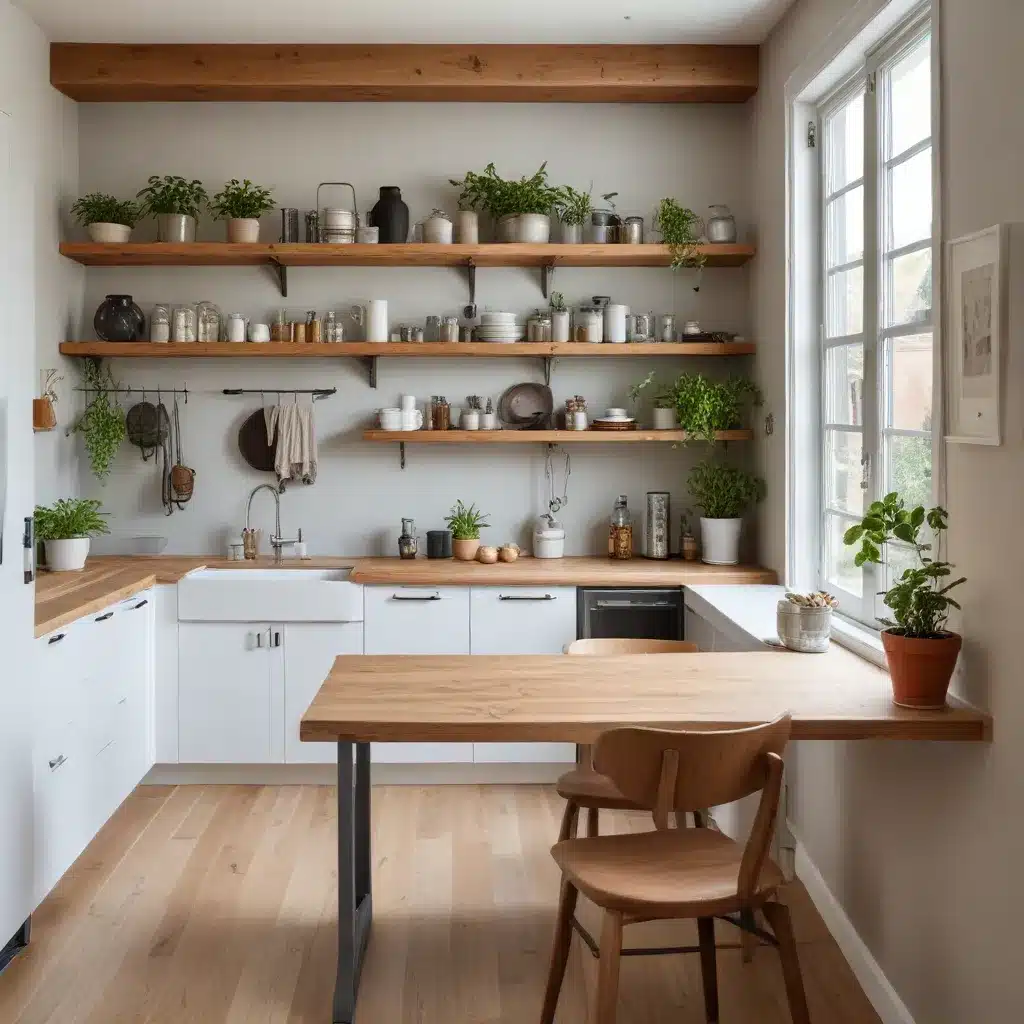As an experienced home improvement consultant, I’ve seen firsthand the challenges and opportunities that come with sustainable renovations, especially in tight spaces. When it comes to small-space transformations, eco-friendly sourcing strategies can make a big difference in reducing environmental impact, optimizing resources, and creating healthy, functional living areas.
Eco-Friendly Material Selection
The foundation of any sustainable renovation lies in the careful selection of low-impact materials. Look for products that are recycled, renewable, or recyclable, such as bamboo flooring, low-VOC paints, and natural fiber insulation. Evaluate the embodied carbon and water footprint of building materials, favoring options with third-party environmental certifications like GREENGUARD or Cradle to Cradle.
Prioritize locally sourced and regionally manufactured goods to minimize the carbon emissions associated with long-distance transportation. Research innovative materials made from agricultural byproducts, such as wheat straw particleboard or cork insulation, which offer both sustainability and space-saving benefits.
Minimizing Environmental Impact
Beyond material selection, consider the broader environmental impact of your renovation choices. Opt for energy-efficient windows, LED lighting, and high-performance appliances to reduce long-term energy consumption. Incorporate passive solar design strategies, like strategically placed windows and thermally-insulated walls, to harness natural heating and cooling.
Water conservation is also key in small-space renovations. Install low-flow fixtures, drought-tolerant landscaping, and consider greywater systems to minimize freshwater usage. Thoughtfully manage construction waste, diverting as much as possible from landfills through recycling, donation, or repurposing.
Circular Design Principles
Embracing circular economy principles can unlock innovative small-space solutions. Look for upcycled or repurposed furnishings, such as vintage dressers converted into vanities or industrial pipe shelving. Incorporate modular or multifunctional designs that allow for easy reconfiguration as needs change over time.
Collaborate with local makers, artisans, and small businesses to source one-of-a-kind pieces that embody sustainability. These partnerships not only support the local economy but also foster a unique, personalized aesthetic that celebrates the character of your home.
Spatial Constraints
Navigating the challenges of small-space renovations requires creative problem-solving and a deep understanding of your available square footage. Maximize vertical storage, opt for compact appliances, and utilize transformable furniture that can adapt to different uses. Strategically place mirrors to create the illusion of depth and amplify natural light.
Carefully consider traffic flow and the placement of key functional areas, such as the kitchen, bathroom, and home office. Employ multifunctional zones that seamlessly integrate various activities, like a combined living and dining room or a bedroom that doubles as a workspace.
Resource Optimization
In small-space projects, the effective use of resources is paramount. Prioritize modular, adaptable, and space-saving products that can be easily reconfigured or repurposed as needs evolve. Optimize storage solutions, such as built-in cabinetry, sliding doors, and hidden compartments, to minimize clutter and maximize usable square footage.
Explore innovative prefabricated or off-site construction methods, which can streamline the renovation process and minimize material waste. Collaborate with design professionals who specialize in small-space optimization to uncover unique solutions tailored to your specific needs.
Ethical Procurement Practices
Sustainable sourcing extends beyond environmental considerations to encompass social responsibility and ethical labor practices. Seek out transparent suppliers who can provide detailed information about their manufacturing processes, supply chain, and worker treatment.
Look for companies that adhere to fair labor standards, offering livable wages, safe working conditions, and equitable opportunities. Prioritize minority-owned, women-owned, and local businesses to support inclusive economic development in your community.
Engage with responsible waste management systems that ensure construction debris is properly recycled, repurposed, or disposed of in an environmentally-conscious manner. Consider partnering with nonprofit organizations that divert usable materials from landfills and make them available for community use.
Upcycled and Repurposed Materials
The small-space renovation landscape is rife with opportunities to incorporate upcycled and repurposed materials. Scour architectural salvage yards, flea markets, and online platforms for unique finds, such as vintage doors, reclaimed wood, or industrial-chic lighting fixtures.
Collaborate with local artisans and craftspeople to breathe new life into discarded items, transforming them into custom furnishings or decorative accents. Encourage your contractor to find creative ways to reuse or recycle construction waste, minimizing the need for virgin materials.
Local and Regional Suppliers
Sourcing materials and products from local and regional suppliers can have a profound impact on the environmental and social sustainability of your small-space renovation. These businesses often have a deeper understanding of the unique needs and preferences of your community, allowing them to provide tailored solutions.
By supporting local manufacturers, you can reduce the carbon footprint associated with long-distance transportation while also contributing to the economic vitality of your neighborhood. Look for certified B Corporations, family-owned enterprises, and minority-owned businesses that align with your values.
Collaborative Sourcing Networks
Small-space renovators can leverage the power of collaborative sourcing networks to access a diverse range of sustainable materials and services. Connect with local design and construction professionals, online forums, and community organizations to share resources, exchange ideas, and stay informed about the latest eco-friendly trends and products.
Platforms like the Reluctant Renovator provide a hub for like-minded homeowners and industry experts to collaborate, crowdsource solutions, and discover innovative small-space renovation strategies. By tapping into these collaborative networks, you can unlock a wealth of sustainable sourcing opportunities tailored to your unique project needs.
Sustainable sourcing for small-space renovations is a multifaceted endeavor that requires a holistic approach. By prioritizing eco-friendly materials, minimizing environmental impact, and embracing circular design principles, you can create beautiful, functional living spaces that align with your values and contribute to a more sustainable future. Leveraging ethical procurement practices, upcycled solutions, and collaborative sourcing networks can further amplify the positive impact of your small-space transformation.
As an experienced home improvement consultant, I encourage you to explore these sustainable sourcing strategies and adapt them to the unique needs and constraints of your project. With a little creativity and a commitment to sustainability, you can turn your small-space renovation into a shining example of responsible, eco-conscious design.




